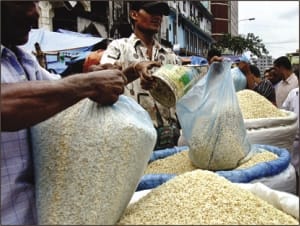Polybags bounce back

The use of polybags increases during Ramadan. Unlike previous years the bags are now being produced without handles. Photo: Anisur Rahman
Production and use of hazardous polythene bags have increased alarmingly in the city due to lax government monitoring and absence of mobile court operation.
Shopping bag traders said the use of polythene bags has increased even further with the arrival of Ramadan, posing threat to public health.
One of the wholesalers of shopping bags at Karwan Bazar said the demand for polythene bags increases during Ramadan as iftar sellers wrap food items in small polythene bags. Customers also accept this and find it easy to carry iftar items in polybags.
“No one came to raid the market for a long time to check the sale of polythene bags. We just provide what people want,” he said.
Most of this polythene bags are recycled from discarded polybags, which is extremely hazardous to public health, experts said.
Unscrupulous manufacturers and traders of polythene shopping bags are making extra profits while Dhaka residents are returning to the old habit.
Polythene is available in every kitchen market. Every vegetable seller in the kitchen and fish markets use polybags. It is also available in the grocery shops, general stores and even with the street side hawkers and vendors.
Unlike the previous ones, producers are now making polythene bags without handles. The factories are located mostly in the old part of Dhaka while the main wholesale markets are at Chawkbazar, Begumbazar, Moulvibazar and Karwanbazar.
Polythene shopping bags were introduced in Bangladesh in 1980s, which quickly replaced the use of traditional jute bags in every household of Bangladesh.
It was reported in the early 2000 that every day nearly 10 million polythene bags were disposed of by Dhaka residents. The discarded polythene bags as a non-biodegradable environmental hazard played havoc with the city's sewerage system.
On January 1, 2002, the government imposed a ban on production, marketing and use of polythene (bellow 100-micron thick) in Dhaka city, followed by a nationwide ban on April 8 of the same year.
Fourteen items were exempted from this ban. These include biscuit, chanachur, bread, salt, vermicelli, medicine, flour, naphthalene, fertilizer, chocolate and milk powder. However, polybag produced for these items must be above 100 microns. The law was not applicable for export-oriented polythene production.
With the hazardous polythene coming back in the market, environmentalists say the campaign against polythene must be restarted before it goes back to its previous extent.
“The campaign was successful for a few years in the beginning. However, changes in the political scenario in recent time have been overshadowing all the efforts that was made to combat the havoc caused by polythene,” said Syeda Rizwana Hasan, director of programmes, Bangladesh Environment Lawyers Association (Bela).
“Monitoring from the government is completely missing. The government needs to restart the entire campaign immediately,” she said.
“At the same time it is important to create alternative packaging items. The big stores have already developed alternative products but the kitchen markets did not yet start use of alternative packaging materials,” Hasan noted.
Officials concerned however said it has become hard to combat illegal polythene producers because of the absence of mobile court drive.
They said under the newly promulgated Mobile Court Ordinance it is no longer possible to conduct a mobile court to stop anything going harmful to environment as it does not mention the Environment Conservation Act 1995.
“We cannot conduct mobile court drives after the separation of judiciary. Earlier, we used to request the DC office for a magistrate. But now their job is not under DC office,” said Neyamatullah Bhuiyan, director (Dhaka Division), Department of Environment.
“We have requested the law ministry to include Environment Conservation Act under the Mobile Court Ordinance so that we can conduct mobile court drive,” he added.
Separation of the judiciary from the executive was implemented on November 1 last year.
“We are conducting drive with the help of law enforcers. However, the situation requires more frequent drives and follow-ups, which we cannot maintain for severe manpower shortage,” Neyamatullah added.
The officials said a drive was conducted last month with the help of Rapid Action Battalion in which 8 warehouses of old Dhaka was sued for hoarding a large quantity of banned polythene bags.
Under the Environment Conservation Act punishment for manufacturing and marketing polythene shopping bag is 10 years' rigorous imprisonment, or a maximum fine of Tk 10 lakh, or both. The sentence can be given only by the Environmental Court.
The fine for using polythene shopping bags for purposes other than export trade is Tk 500.
Recycled Bags Pose Serious Health Hazard
Recycled polythene has become the newest threat to public health.
According to experts, ingesting polythene-wrapped food is harmful for health, especially the recycled and coloured polythene. Newly produced polythene bags can also cause harm to human body as these are not food-graded.
“During remoulding plastic bags, a chemical agent called plasticizer is used for making it soft. This agent remains in the plastic item after production. Food wrapped up in polythene can be contaminated with plasticizer which is harmful for human body,” said Dr Reza-ul-Jalil, chairman, Department of Pharmaceuticals Technology, University of Dhaka.
“There is no immediate effect of plasticizer to human body. However, it can cause harm if food wrapped in polythene is ingested for a longer period. Plasticizer is an agent of cancer, skin diseases, allergy, gastronomic illness and other health problems,” he said.
Plasticizer is also present in newly produced polythene in smaller amount, he added.
Polythene-wrapped fish, meat and vegetables also get infected by anaerobic bacteria, a germ responsible for skin disease and cancer, according to a study.
It is possible to identify recycled polythene or plastic item. Usually it gives away a strong odour, Jalil said.

 For all latest news, follow The Daily Star's Google News channel.
For all latest news, follow The Daily Star's Google News channel. 



Comments